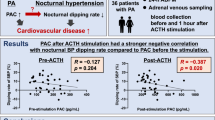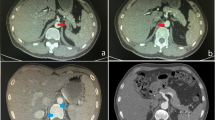Abstract
Glucocorticoid-remediable aldosteronism (GRA) is a rarely recognised cause of arterial hypertension. We report the features of a 13-year-old boy with hypertension (casual blood pressure (BP) 140–180/95-110 mm Hg) discovered during a routine paediatric check. Ambulatory BP monitoring (ABPM) revealed significant hypertension with an abolished nocturnal BP fall (mean daytime BP 155/108 mm Hg, mean night-time BP 156/104 mm Hg, nocturnal BP fall 0/4%) which was indicative of secondary hypertension. Despite triple antihypertensive drug therapy the hypertensive control was unsatisfactory. Laboratory tests revealed hypokalaemia (3.0 mmol/l), suppressed plasma renin activity (0.012 nmol/l/h) and high plasma aldosterone (1.190 nmol/l). The diagnosis of primary hyperaldosteronism was established and GRA was further confirmed by the presence of the chimaeric GRA-gene and dexamethasone therapy was initiated. During the next 2 months of dexamethasone therapy all three antihypertensive drugs were discontinued and BP remained under control with restoration to a normal nocturnal BP fall (mean daytime BP 129/77 mm Hg, mean night-time BP 113/64, nocturnal BP fall 12/17%). A change of therapy from dexamethasone to spironolactone was necessary due to the side effects of corticosteroids after 3 months. Spironolactone alone (0.8–2 mg/kg/day) was able to control the BP sufficiently. In conclusion, to our knowledge, this is the first reported case of abolished nocturnal BP fall in a patient with genetically proven GRA. This study indicates that GRA can cause severe hypertension even in children, associated with an abolished nocturnal BP fall. GRA thus should be excluded in all hypertensive patients with circadian BP rhythm disturbances.
This is a preview of subscription content, access via your institution
Access options
Subscribe to this journal
Receive 12 digital issues and online access to articles
$119.00 per year
only $9.92 per issue
Buy this article
- Purchase on Springer Link
- Instant access to full article PDF
Prices may be subject to local taxes which are calculated during checkout
Similar content being viewed by others
Author information
Authors and Affiliations
Rights and permissions
About this article
Cite this article
Seeman, T., Widimský, J., Hampf, M. et al. Abolished nocturnal blood pressure fall in a boy with glucocorticoid-remediable aldosteronism. J Hum Hypertens 13, 823–828 (1999). https://doi.org/10.1038/sj.jhh.1000918
Received:
Accepted:
Published:
Issue Date:
DOI: https://doi.org/10.1038/sj.jhh.1000918
Keywords
This article is cited by
-
Prevalence of primary hyperaldosteronism in moderate to severe hypertension in the Central Europe region
Journal of Human Hypertension (2003)



